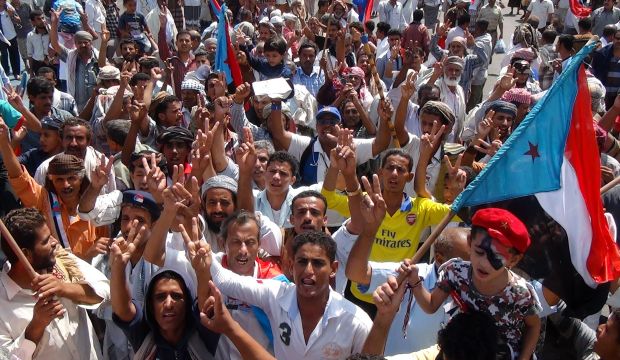
Yemeni supporters of the separatist southern movement demonstrate following Friday prayers on February 13, 2015, in Aden.
(AFP Photo/STR)
Sana’a, Asharq Al-Awsat—Yemen’s southern tribes will discuss the formation of a unified command on Monday, a senior tribal official said, as Al-Qaeda-linked militants lay siege to another military base in the south.
Speaking to Asharq Al-Awsat, the leader of Hadhramaut tribal alliance Omar Ben Habrish said tribes will meet on Monday to discuss ways to fill the security vacuum in southern Yemen, including a proposal to form a unified command to run oil infrastructure and maintain security in the strategic area.
Habrish, whose alliance represents approximately two million tribesmen in the southern provinces of Hadhramaut, Shabwah and Al-Mahrah, said that his group will do everything in its power to safeguard the natural resources of the region.
The southern provinces are home to almost 70 percent of Yemen’s oil and gas infrastructure.
Meanwhile, Al-Qaeda-linked fighters began a siege of an army base between the southern provinces of Ma’rib and Hadhramaut on Friday, Yemen military sources told Asharq Al-Awsat, a day after the militants stormed a key base in Shabwah.
Tensions escalated in southern Yemen after militants from the Al-Qaeda-linked Ansar Al-Sharia group stormed and looted the military base in Shabwah housing 2,000 soldiers from the 19th infantry brigade on Thursday.
At least 15 Islamist militants and 12 Yemeni soldiers were killed during the clashes, police sources said.
The attack marked the most significant Al-Qaeda incursion into the south and prompted a key southern secessionist group to point fingers at army officials for “facilitating” the takeover. The secessionists demanded greater control over army bases in the region.
Radical Islamist militants have recently stepped up attacks in Yemen in response to the growing influence of the rival Houthis, who dissolved the parliament and became de facto leaders of the country last week.
Many in Yemen accuse the Houthi movement of using its rivalry with Al-Qaeda to justify its expansionist strategy.
What happened at the Shabwah military base “seems to have been part of a scheme to show that the south is a hotbed for Al-Qaeda, and thus to justify access or occupation of the south by the Houthi movement,” the Secretary-General of the League of the Sons of the Free Arab South (the League) Muhsin Bin Farid told Asharq Al-Awsat.
Separatist sentiments have been growing in southern Yemen following the Houthi takeover of the capital Sana’a and large parts of Yemen in September.
“I am certain Al-Qaeda cannot pose a real risk should a [southern] state be present. We are confident that the establishment of a new southern state will put an end to Al-Qaeda acts and religious radicalism,” said Farid.
Meanwhile, two unidentified gunmen on a motorbike shot dead a colonel in the southern province of Lahj on Friday, eyewitnesses said.
Air force Col. Mahmud Al-Naqeeb was walking in the city of Al-Hawta when two assailants opened fire on him. Al-Qaeda in the Arabian Peninsula (AQAP) has assassinated dozens of military and security personnel across Yemen, particularly in the southern areas, over the past three years.
The foreign ministers of the Gulf Cooperation Council (GCC) are set to gather in Riyadh on Saturday to discuss developments in neighboring Yemen.
The six oil-rich states have strongly condemned the “constitutional declaration” issued by the Houthis last week to dissolve parliament and boost their control over the state.
Saudi Arabia, the GCC’s most powerful member, evacuated diplomatic staff at its embassy in Sana’a on Friday, citing “deterioration in security and political conditions.”
Several Western governments, including the US, have suspended diplomatic activities in Sana’a this week.
